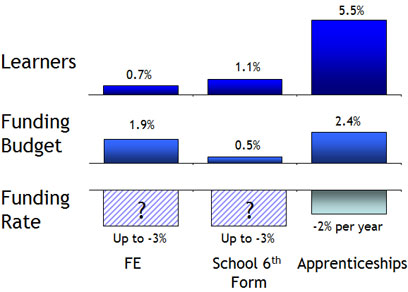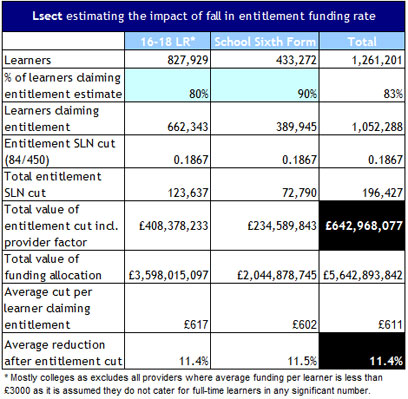



All
have places available unless stated
16-06-11 : London
Summer
College Data Conference : Book early
--------------------------------------------------------------------
What
previous Lsect delegates said
“Very useful
event and would recommend other
staff to attend any future events”
Joe Keegan, Director of College Services, Tribal Education
“Fantastic
event! Thoroughly worthwhile”
Jo Brannen, Programme Manager, City College
“Highly informative,
very insightful and delivered at
pace with enthusiasm. Ice cream was great!”
Brenda Cook, WBL, Northbrook College
“The event
was very empowering and informative”
Ashok Ramanathan, MIS Analyst, Redbridge College
Click here more for comments from past attendees.
Quick links to resources
and fun:
~ Nick Linford's blog join
the debate
~ Say thanks with
a HKF donation please
~ Sub-contracting toolkit MCL
policy etc
~ Free ILR Utility Version
3
~ Apprenticeship
software Request info
~ Data credibility
software No excuses
~ Need Media or PR help?
Lsect recommends EMPRA
~ Principal's Pets More
please
~ Lsect ESOL Funding Summit (12/01/11)
~ Lsect 16-18 Funding Summit
(08/02/11)
~ Lsect Spring College Data
Conference (03/03/11)
~ Lsect
College Media and PR Conference (08/03/11)
~ Lsect Apprenticeship Funding
Summit (15/03/11)
~
Lsect Adult Funding Summit (22/03/11)
To receive
these updates via email join at www.lsect.co.uk/join.asp
Please pass this information on to colleagues that may find it useful. Thanks.
YPLA 16-18 Funding Statement
On the 20th December the YPLA finally published their equivalent of the SFAs
Investment Strategy, which they called their ‘Funding Statement’.
To download the document click on this link: http://tinyurl.com/388vx8d
I’ve picked out a
few highlights in this update, the most significant of which is the unexpected
74% rate reduction to entitlement funding.
Funding
statement numbers
At first glance the YPLA funding statement looks relatively positive for FE,
as the funding rises (1.9%) by more than the learner numbers (0.7%). School
Sixth Forms are facing a lower rise (0.5%) for more new learners (1.1%) as
a result of moving downwards towards parity of funding with colleges, and
we now know that Apprenticeships will suffer a 2% funding rate reduction each
year.

However, in reality the budget increase for FE only partly
pays for the costs associated with 16-18 year-olds previously on short courses
that are now enrolling on longer and thus more expensive ones. As paragraph
16 states: “it is expected that part-time programmes will grow in
size as Foundation Learning is implemented and also that there will be a continued
shift from part-time to full-time programmes.”
Cost pressures
and £643m(?) cuts to entitlement
The YPLA have chosen to reduce the funding for entitlement in order to find
the savings necessary to fund more full-time programmes. Entitlement was introduced
in the year 2000, and funds enrichment activities and tutorials. The funding
statement confirms that this will be reduced by 74% from 114 funded hours
(SLN GLH) to just 30.
I also understand
that it is likely the annual per learner 1.75 SLN cap will be reduced to 1.56
SLN (regardless of whether entitlement is claimed), and the Skills Funding
Agency are in discussion with the YPLA about ‘funding alignment’
(so also applying the same reduced cap)
Unfortunately the YPLA funding statement does not indicate the savings that
this 74% rate reduction will create, although using the 2010/11 allocations
spreadsheet it is possible to make an educated estimate. Estimating the impact
is complicated by the fact that some providers will already have a reduced
SLN per learner ratio, or deliver provision above the current 1.75 cap and
some 19 year-olds on entitlement are funded by the Skills Funding Agency at
YPLA rates. However, the table below summarises my estimate, which excludes
providers with an average lower than £3000 per learner and assumes between
80-90% of learners will be claiming entitlement. I conclude that if implemented
without transitional protection it would save approximately £611 per
learner claiming entitlement, £643m in total, and reduce budgets for
schools and colleges by an average of 11.4%.

You can download my workings (blue columns applied to the
2010/11 allocations spreadsheet here) and alter the percentage claiming entitlement
to see impact on individual providers here: http://tinyurl.com/38d623k
The reduction to 30 hours
is much greater than most (anyone?) had been expecting. It also seems an odd
number, unless the YPLA think schools and colleges will move to 30 weeks a
year in order to save costs. A more obvious SLN GLH rate would have been 36
(the rate at which Key Skills are funded), representing one hour per week
for twelve weeks per term.
Value of
enrichment activities and tutorials to learnersIt
is worth reading a research report published in July 2010 from RCU (funded
by LSIS) called “The Hidden Advantage: Delivering Excellence in
Tutorial Support”: http://tinyurl.com/23hc3a8
This includes statements
such as:
Para 4.4: “A
key concern voiced by some senior college staff was the risk to the tutorial
system if there was any reduction in the paid glh allocated to the entitlement
as it was felt that this would have a major impact on students.”
Para 4.13: "In
the eyes of the College, tutorials are the glue which binds the learner journey
as a whole."
Para 5.6: "A key
question for the future will be can colleges produce the same level of quality
of outcomes for students with lower cost models?"
Impact
on Ofsted inspection framework and grades?
The RCU research points out in paragraph 4.3: “The guidance for
Osfted inspectors, the Handbook for Inspectors, requires inspectors to take
account of enrichment activities, while tutorials get a specific mention in
relation to the level of young people’s knowledge around equality and
diversity.” Therefore, assuming providers cut back on these activities
by 75% will Ofsted also be expecting less? Will it be fair to compare providers
before and after this policy unless the inspection framework recognises these
cuts? It will be interesting to see if this policy change to entitlement is
discussed with Ofsted at their Select Committee hearing on the 12th of January.
Enrichment funding no longer ‘ring-fenced’
The Foreword to the RCU paper says that “For many years we have
scrutinised teaching delivery to increase class sizes, reduce course hours
and maximise teacher contact to ensure the money goes further without compromising
quality. But it is rare to find colleges viewing their heavy investment in
personal tutorial work in the same light, despite the fact that ‘enrichment’,
for want of a better name, is part of the former LSC’s funding tariff.”
And paragraph 5.1 is particularly interesting as it says "One major
concern to colleges would be how to maintain tutorials and enrichment activities
if this funding was no longer ring-fenced".
This is interesting as
in contrast the YPLA specifically points out they are moving away from ring-fencing
so “schools and colleges will have the freedom to employ the strategies
that they know will support their students to increase their attainment”.
These freedom arguments
are also used for scrapping EMA policy, as well as in other areas of Government
cuts (such as Local Authority budgets). Unfortunately, the investment in freedom
(£150m ~ see below) is much less than the ring-fenced cut.
Increasing
by £150m the funding for the disadvantaged
The funding statement says it will use some of the entitlement savings “will
be redirected using the disadvantage uplift [IMD 2007] and the Additional
Learning Support elements in the funding formula.”
Transitional protection
The funding statement says they will “limit the reduction in the
average funding per learner in 2011/12 to a maximum of 3% per young person
in learning" and that it will continue in some form until 2014.
SLN per learner
ratio ceiling
Providers (based on type) who are in the top 20% of SLN per learner ratios
“will be reduced half way to the 80th percentile.” Based
on 2010/11 SLN per learner ratios the AoC estimate the ceiling and those that
will be affected as follows:
Sixth Form Colleges
1.5700 – will potentially affect 19 SFCs
Agricultural and Horticultural Colleges
1.4017 – will potentially affect 4 AHCs
Further Education Colleges
1.3599 – will potentially affect 46 FECs
It is likely that the ceiling
will be applied after the 84 SLN GLH (0.1866r) to entitlement, so very few
may be affected.
Allocation methodology
The ‘lagged learner number’ approach will be used, which basically
means that learner numbers will come from: (2009/10 F01 divided by 2009/10
F05) x 2010/11 LR01
The SLN ratio and provider factor will come from 2009/10 (with the exception
of the success factor, which will be based on success rates 2008/09), and
reduced for the impact of the 75% cut to entitlement funding. The final part
of the allocation formula is the national funding rate, which will not be
announced until March. Given the cuts to the SLN ratio it is possible that
this could go up (e.g. for colleges to join schools on £3,007 per SLN)
yet many schools and colleges would still face the maximum 3% cut to the funding
rate per learner (after transitional protection).
YPLA and
SFA Investment Strategy updates from Lsect – places available
I held my first briefing on this document at Lewisham College last week, which
went very well and you can read comments here: http://www.lsect.co.uk/comments.asp
There are still places for this event in Solihull on the 18th Jan and I have
just started taking bookings for a return visit to Lewisham College on the
25th of Jan. Both can bee booked at www.lsect.com
Have a great break
So, it just leaves me to wish you a great break, and assuming you celebrate
it, Merry Christmas. See you in 2011.
Kind regards,
| |